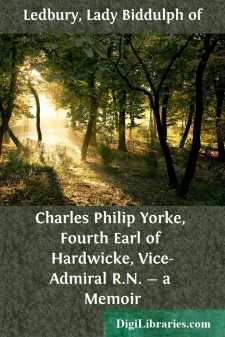Categories
- Antiques & Collectibles 13
- Architecture 36
- Art 48
- Bibles 22
- Biography & Autobiography 813
- Body, Mind & Spirit 142
- Business & Economics 28
- Children's Books 15
- Children's Fiction 12
- Computers 4
- Cooking 94
- Crafts & Hobbies 4
- Drama 346
- Education 46
- Family & Relationships 57
- Fiction 11828
- Games 19
- Gardening 17
- Health & Fitness 34
- History 1377
- House & Home 1
- Humor 147
- Juvenile Fiction 1873
- Juvenile Nonfiction 202
- Language Arts & Disciplines 88
- Law 16
- Literary Collections 686
- Literary Criticism 179
- Mathematics 13
- Medical 41
- Music 40
- Nature 179
- Non-Classifiable 1768
- Performing Arts 7
- Periodicals 1453
- Philosophy 64
- Photography 2
- Poetry 896
- Political Science 203
- Psychology 42
- Reference 154
- Religion 513
- Science 126
- Self-Help 84
- Social Science 81
- Sports & Recreation 34
- Study Aids 3
- Technology & Engineering 59
- Transportation 23
- Travel 463
- True Crime 29
Charles Philip Yorke, Fourth Earl of Hardwicke, Vice-Admiral R.N. - a Memoir
Description:
Excerpt
CHAPTER I
THE YORKE FAMILY
The family of Yorke first came into prominence with the great Chancellor Philip Yorke, first Earl of Hardwicke. This remarkable man, who was the son of an attorney at Dover, descended, it is claimed, from the Yorkes of Hannington in North Wiltshire, a family of some consequence in the fifteenth and sixteenth centuries, was born in that town in the year 1690, and rose from a comparatively humble station to the commanding position he held so long in English public life.
My object in this chapter is to recall some of the incidents of his career and of those of his immediate successors and descendants.
Philip Yorke was called to the bar in 1715, became Solicitor-General only five years later, and was promoted to be Attorney-General in 1723. In 1733 he was appointed Lord Chief Justice of England, and received the Great Seal as Lord Chancellor in 1737, and when his life closed his political career had extended over a period of fifty years.
Lord Campbell, the author of the 'Lives of the Chancellors,' 'that extraordinary work which was held to have added a new terror to death, and a fear of which was said to have kept at least one Lord Chancellor alive,' claimed to lay bare the shortcomings of the subjects of his memoirs with the same impartiality with which he pointed out their excellences. He mentions only two failings of Lord Chancellor Hardwicke: one, that he was fond of acquiring wealth, the other, that he was of an overweening pride to those whom he considered beneath him. Neither of these is a very serious charge, and as both are insufficiently corroborated, one may let them pass. He acquired immense wealth in the course of his professional career, but in an age of corruption he was remarked for his integrity, and was never suspected or accused of prostituting his public position for private ends. In his capacity of Attorney-General Lord Campbell remarks of him:
'This situation he held above thirteen years, exhibiting a model of perfection to other law officers of the Crown. He was punctual and conscientious in the discharge of his public duty, never neglecting it that he might undertake private causes, although fees were supposed to be particularly sweet to him.'
But it was as a judge that he won imperishable fame, and one of his biographers observes: [Footnote: See Dictionary of National Biography.] 'It is hardly too much to say that during his prolonged tenure of the Great Seal (from 1737 to 1755) he transformed equity from a chaos of precedents into a scientific system.' Lord Campbell states that 'his decisions have been, and ever will continue to be, appealed to as fixing the limits and establishing the principles of that great juridical system called Equity, which now, not only in this country and in our colonies, but over the whole extent of the United States of America, regulates property and personal rights more than ancient Common Law.'
He had a 'passion to do justice, and displayed the strictest impartiality; and his chancellorship' is 'looked back upon as the golden age of equity.' The Chancellor is said to have been one of the handsomest men of his day, and 'his personal advantages, which included a musical voice, enhanced the effect of his eloquence, which by its stately character was peculiarly adapted to the House of Lords.' [Footnote: Ibid.]
This is not the place for an estimate of Lord Hardwicke's political career, which extended over the whole period from the reign of Queen Anne to that of George III, and brought him into intimate association with all the statesmen of his age....


